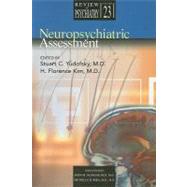- ISBN: 9781585621774 | 1585621773
- Cover: Paperback
- Copyright: 4/30/2004
What is neuropsychiatry? This remarkable volume answers that question-and more. Neuropsychiatry, which focuses on assessment and diagnostic issues at the interface of psychiatry and neurology, is enjoying a renaissance, largely because of the technological innovations detailed in these five chapters. Here, 11 recognized experts have assembled an overview of the essential techniques, current research, and future trends in neuropsychiatric assessment, focusing on clinical applications for psychiatry patients. This eminently practical work begins with the cornerstone of any neuropsychiatric assessment, the physical examination and the medical and psychiatric history. Included here is a head-to-toe compendium of important signs and symptoms to elicit, along with the differential diagnoses of neuropsychiatric disorders to consider when faced with a particular constellation of signs and symptoms. Subsequent chapters discuss The critical importance of the neuropsychological examination, traditionally administered by neuropsychologists and thus often overlooked by psychiatrists in routine workups of their patients. Topics addressed include the clinical approach to the interview process, fixed- and flexible-battery approaches to assessment, interpretation pitfalls, and future trends. The authors illustrate how this essential tool can reveal the major cognitive domains that may be involved in neuropsychiatric disorders and show how specific patterns of deficits in certain domains may help determine a neuropsychiatric diagnosis. The relevance of electrophysiological testing, an underused but invaluable resource, to neuropsychiatric disorders. The authors discuss standard, topographic, and quantitative electroencephalography; cerebral evoked potentials, and polysomnography, providing recommendations for the application of these tools in certain clinical situations (e.g., cognitive decline, rapid-cycling bipolar disorder) and projections for broader uses of electrophysiological testing in the future. The key importance of laboratory testing, especially in view of the complex array of neurological and medical illnesses that may underlie the symptoms of neuropsychiatric patients. The lack of consensus guidelines for the use of conventional laboratory testing, chest X rays, and electrocardiograms in screening patients with neuropsychiatric symptoms continues to constrain our ability to help these patients. The potential of today's increasingly sophisticated neuroimaging approaches-from structural and functional magnetic resonance imaging and magnetic resonance spectroscopy to diffusion tensor imaging and positron emission tomography-to reveal the brain and its pathways with unprecedented clarity. The authors provide a fascinating overview of the techniques involved and the current research findings in schizophrenia, major affective disorder, and obsessive-compulsive disorder. Intended to bring us closer to our goals of early detection of, more specific treatments for, and, ultimately, prevention of psychiatric illness, this in-depth yet concise volume on the research and practice of neuropsychiatry will find a wide audience among students, residents, and clinicians.






